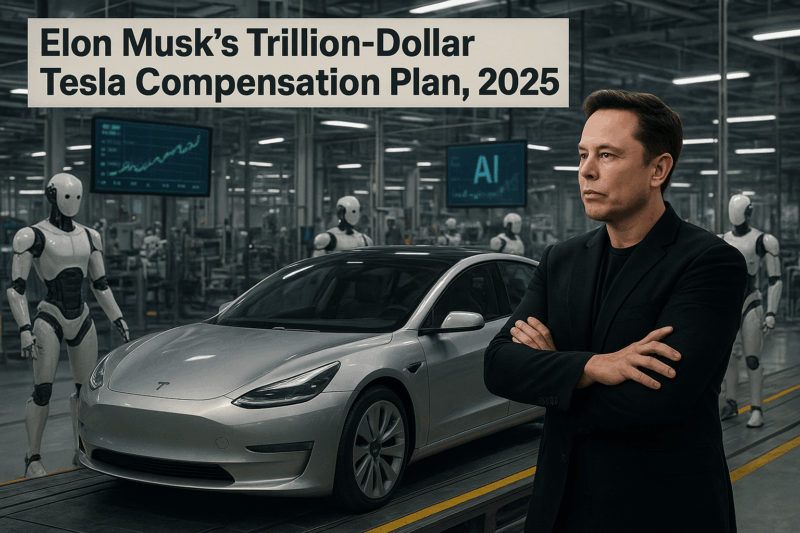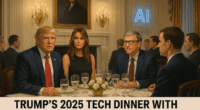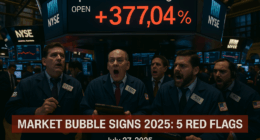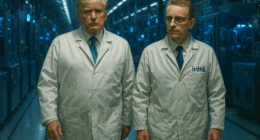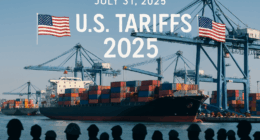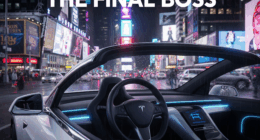A Bold Vision for Tesla’s Future
In a world captivated by innovation, Elon Musk’s new Tesla compensation package has ignited both excitement and skepticism. Unveiled on September 5, 2025, this audacious plan could make Musk the world’s first trillionaire, tying his fortune to Tesla’s ability to achieve unprecedented growth. With a proposed 423.7 million additional shares, potentially worth $143.5 billion, the package hinges on Tesla reaching a staggering $8.5 trillion market cap—a leap from its current $1.1 trillion. This move underscores Musk’s relentless drive to transform Tesla into an AI and robotics powerhouse, but it also raises questions about fairness and feasibility in a competitive landscape.
Human Toll of High Stakes
The weight of this compensation plan extends beyond numbers, touching the lives of Tesla’s employees, shareholders, and even Musk himself. For workers, Musk’s vision promises job growth in cutting-edge fields like autonomous vehicles and humanoid robots, yet the pressure to meet lofty milestones could strain teams already navigating a turbulent market. Shareholders face a dilemma: supporting Musk’s ambition risks diluting their stakes, but his leadership has historically driven Tesla’s meteoric rise. For Musk, the package is a personal gamble—his wealth and legacy are tied to Tesla’s success, demanding his focus amid distractions from ventures like SpaceX, xAI, and political endeavors. The human element lies in balancing trust in Musk’s genius with the realities of an uncertain future.
Facts and Figures of the Pay Package
The proposed package, detailed in Tesla’s proxy statement, grants Musk 423.7 million shares, valued at $143.5 billion at current prices, but only if Tesla’s market cap hits $8.5 trillion—nearly eight times its current $1.1 trillion valuation. Musk currently owns 410 million shares (18% of Tesla, worth $139 billion) and has options for 304 million more, though these were struck down twice by a Delaware court in 2024 for being unfair. The new plan requires Musk to meet ambitious operational goals, like tripling earnings, and hold shares for 7.5 years. A shareholder proposal also suggests Tesla invest in Musk’s xAI, which recently acquired X for $44 billion, raising concerns about consolidating his empire.
Broader Context: AI, Competition, and Corporate Governance
This compensation plan arrives as Tesla pivots from electric vehicles to AI and robotics, with Musk touting robotaxis and humanoid robots as future profit drivers. Yet, competition looms large—Chinese automaker BYD threatens to overtake Tesla in global EV sales, while Waymo leads in robotaxi services. Historically, Musk’s 2018 package, once valued at $56 billion, delivered massive growth, but legal battles exposed governance flaws, with courts citing an overly cozy board. The shift to Texas incorporation aims to sidestep Delaware’s scrutiny, but critics argue Musk’s existing 18% stake already incentivizes performance, drawing parallels to CEOs like Jeff Bezos who thrived without such massive awards.
Governance and Shareholder Concerns
The plan’s scale has reignited debates over Tesla’s board independence, with past rulings criticizing Musk’s influence over directors. Shareholders, while supportive in past votes, face risks of dilution, prompting thousands to protest similar fee requests by lawyers challenging Musk’s 2018 package.
What Lies Ahead: Resilience or Overreach?
Looking forward, Tesla’s success hinges on Musk delivering on promises like robotaxis and humanoid robots, which could redefine transportation and labor. Yet, his divided attention—across xAI, SpaceX, and political ventures—raises concerns about execution. The proposed xAI investment could bolster Tesla’s AI capabilities but risks perceptions of self-dealing. Globally, the plan sets a precedent for tying CEO pay to transformative goals, but failure could erode trust. Tesla’s resilience will depend on balancing innovation with governance, ensuring Musk’s vision doesn’t outpace practical realities.
Conclusion: A High-Stakes Leap for Tesla and Musk
Elon Musk’s new Tesla compensation package is a daring bet on a future where AI and robotics redefine industries. While it promises unparalleled growth, it tests the limits of shareholder trust and corporate governance. As Tesla navigates competition and Musk juggles his empire, this plan could either cement his legacy as a visionary or highlight the risks of unchecked ambition. The world watches as Tesla’s trillion-dollar dream unfolds.

